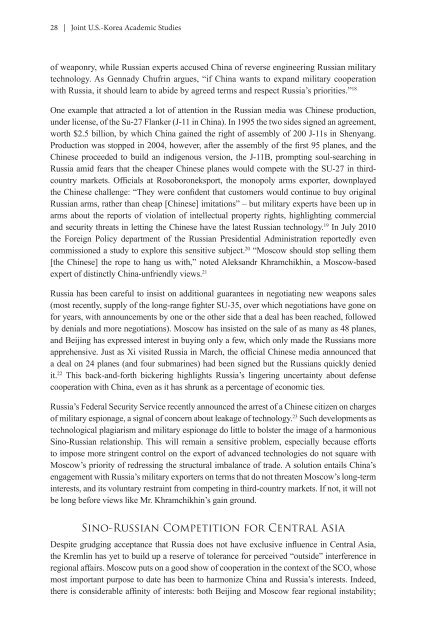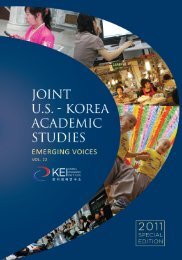the full publication PDF - Korea Economic Institute
the full publication PDF - Korea Economic Institute
the full publication PDF - Korea Economic Institute
You also want an ePaper? Increase the reach of your titles
YUMPU automatically turns print PDFs into web optimized ePapers that Google loves.
28 | Joint U.S.-<strong>Korea</strong> Academic Studies<br />
of weaponry, while Russian experts accused China of reverse engineering Russian military<br />
technology. As Gennady Chufrin argues, “if China wants to expand military cooperation<br />
with Russia, it should learn to abide by agreed terms and respect Russia’s priorities.” 18<br />
One example that attracted a lot of attention in <strong>the</strong> Russian media was Chinese production,<br />
under license, of <strong>the</strong> Su-27 Flanker (J-11 in China). In 1995 <strong>the</strong> two sides signed an agreement,<br />
worth $2.5 billion, by which China gained <strong>the</strong> right of assembly of 200 J-11s in Shenyang.<br />
Production was stopped in 2004, however, after <strong>the</strong> assembly of <strong>the</strong> first 95 planes, and <strong>the</strong><br />
Chinese proceeded to build an indigenous version, <strong>the</strong> J-11B, prompting soul-searching in<br />
Russia amid fears that <strong>the</strong> cheaper Chinese planes would compete with <strong>the</strong> SU-27 in thirdcountry<br />
markets. Officials at Rosoboroneksport, <strong>the</strong> monopoly arms exporter, downplayed<br />
<strong>the</strong> Chinese challenge: “They were confident that customers would continue to buy original<br />
Russian arms, ra<strong>the</strong>r than cheap [Chinese] imitations” – but military experts have been up in<br />
arms about <strong>the</strong> reports of violation of intellectual property rights, highlighting commercial<br />
and security threats in letting <strong>the</strong> Chinese have <strong>the</strong> latest Russian technology. 19 In July 2010<br />
<strong>the</strong> Foreign Policy department of <strong>the</strong> Russian Presidential Administration reportedly even<br />
commissioned a study to explore this sensitive subject. 20 “Moscow should stop selling <strong>the</strong>m<br />
[<strong>the</strong> Chinese] <strong>the</strong> rope to hang us with,” noted Aleksandr Khramchikhin, a Moscow-based<br />
expert of distinctly China-unfriendly views. 21<br />
Russia has been careful to insist on additional guarantees in negotiating new weapons sales<br />
(most recently, supply of <strong>the</strong> long-range fighter SU-35, over which negotiations have gone on<br />
for years, with announcements by one or <strong>the</strong> o<strong>the</strong>r side that a deal has been reached, followed<br />
by denials and more negotiations). Moscow has insisted on <strong>the</strong> sale of as many as 48 planes,<br />
and Beijing has expressed interest in buying only a few, which only made <strong>the</strong> Russians more<br />
apprehensive. Just as Xi visited Russia in March, <strong>the</strong> official Chinese media announced that<br />
a deal on 24 planes (and four submarines) had been signed but <strong>the</strong> Russians quickly denied<br />
it. 22 This back-and-forth bickering highlights Russia’s lingering uncertainty about defense<br />
cooperation with China, even as it has shrunk as a percentage of economic ties.<br />
Russia’s Federal Security Service recently announced <strong>the</strong> arrest of a Chinese citizen on charges<br />
of military espionage, a signal of concern about leakage of technology. 23 Such developments as<br />
technological plagiarism and military espionage do little to bolster <strong>the</strong> image of a harmonious<br />
Sino-Russian relationship. This will remain a sensitive problem, especially because efforts<br />
to impose more stringent control on <strong>the</strong> export of advanced technologies do not square with<br />
Moscow’s priority of redressing <strong>the</strong> structural imbalance of trade. A solution entails China’s<br />
engagement with Russia’s military exporters on terms that do not threaten Moscow’s long-term<br />
interests, and its voluntary restraint from competing in third-country markets. If not, it will not<br />
be long before views like Mr. Khramchikhin’s gain ground.<br />
Sino-Russian Competition for Central Asia<br />
Despite grudging acceptance that Russia does not have exclusive influence in Central Asia,<br />
<strong>the</strong> Kremlin has yet to build up a reserve of tolerance for perceived “outside” interference in<br />
regional affairs. Moscow puts on a good show of cooperation in <strong>the</strong> context of <strong>the</strong> SCO, whose<br />
most important purpose to date has been to harmonize China and Russia’s interests. Indeed,<br />
<strong>the</strong>re is considerable affinity of interests: both Beijing and Moscow fear regional instability;










